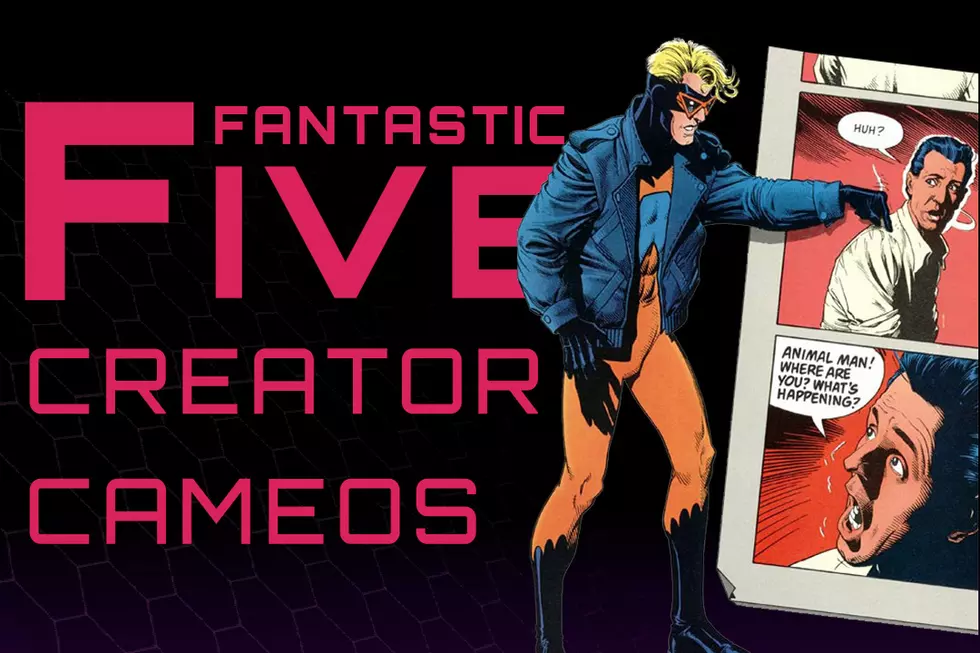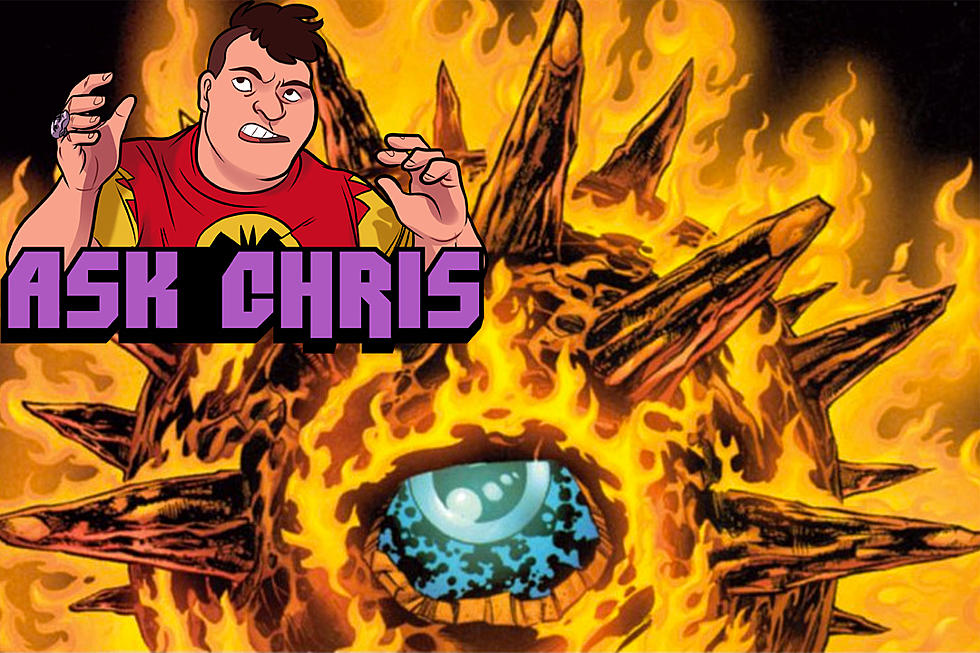
Ask Chris #238: Why You Should Probably Pick Up Walter Simonson’s ‘Orion’
Q: How immediately should we should we all be buying the new Orion by Walt Simonson omnibus? -- @atnorwood
A: Every now and then I like to take a swing at a softball question, but this one is just gently wafting over the plate, taking a moment to stop offer me an engraved invitation. So here's the quick answer: Ideally, you should be buying that Orion omnibus right now, if not sooner, maybe going as far as buying it in back issues too so you have something to read while you wait for it to be delivered. As a general rule of thumb, pretty much anything with the words "WALT SIMONSON" written on the cover is something that's going to be worth having on your bookshelf.
As for why, well, you could sum that up with those same two words, but it goes a little deeper than that. As much as people might talk about Thor, Fantastic Four or even Manhunter, Orion is the one Simonson masterpiece that always seems to get overlooked. And really, that in itself is surprising when you consider that it has one of the single best fight scenes in comics and gave us the greatest Green Lantern of all time.
I think one of the reasons that it's so frequently overlooked is because it comes out of a time when there were just so many good comics coming out of DC. That period between 1997 and about 2002 was one of the best times for the company, especially in terms of the second- and third-string characters.
The only time I can think of that was actually as good was the late '80s, when you had books like Suicide Squad, Justice League International and Animal Man all hitting at the same time, but even then, the turn of the century had an incredible lineup even once you got past the big names. Hitman, Chase, Aztek, Hourman, Impulse, Starman, Power of Shazam, Chronos, Birds of Prey, Superboy, Nightwing --- when that's the lineup of your B-List titles, then getting two years worth of Walt Simonson and John Workman doing a New Gods comic doesn't really seem like something out of the ordinary. It's just another great book on the stands with the rest of 'em.
In retrospect, though, it definitely is out of the ordinary --- mostly because it's the best New Gods book that wasn't written and drawn by Jack Kirby, and takes those characters in a direction that definitely feels like it's continuing the story in a way that's new and exciting, while still building on everything that came before. And not just what came before with those characters at DC, either --- in a lot of ways, it's building on what Simonson did on Thor, too.
I've talked about this a little bit before, but when I was a kid, my dad told me about the New Gods as a bedtime story. Not the actual story about Orion and Darkseid, but about Jack Kirby, and how when he left Thor (my dad's favorite comic going up) and went to DC, he kicked off his new book by killing off all the "old gods" and replacing them with new ones in one of the greatest, most over-the-top examples of a creator distancing himself from his past work and declaring as loudly as he could that he was doing his own thing now. He even went so far as to claim that if you looked close enough, you could see Thor's helmet peeking out of the rubble in New Gods #1 --- you can't, although there is a suspiciously familiar guy swinging around what might be a hammer in the background --- but either way, it was a pretty clear declaration that Thor was the past and Orion was, just as it said on the cover, an epic for our times.
Simonson does the same thing. He even does it literally in #7, where Kalibak gets his hands on a "Thunderbelt," a relic of the Old Gods that doubles his strength and has a big ol' T on the belt buckle, and sure does look a lot like the strength-doubling belt that Thor used when things got rough:
Where it really works, though, both as a callback and a counterpoint, is philosophically.
Thor is, at its heart, a book about noble warriors fighting a noble war. The book's defined by the slow burn of Surtur's attack on Asgard and Thor, Odin and Loki making their desperate last stand to save the nine worlds from Ragnarok, and by characters like Beta Ray Bill, who gave up his humanity in order to better defend his people; Balder, who became a pacifist when he saw the horrors of an immortal life of endless battle but was forced to take up the sword again because he had no other choice; and Skurge, who stood alone at Gjallerbru with a pair of M-16s and redeemd his misspent immortality. They're gods who fought a good fight for good reasons.
In theory, Orion should be the same way. Along with Mr. Miracle, he's the ultimate expression of Kirby's philosophy, that Good and Evil aren't equal and opposite, but that good is inherently stronger, even if it might be the harder path to walk. Orion is the product of pure evil, the son of Darkseid, but being raised on New Genesis as part of The Pact meant that he was shown a better way. The thing is, Orion is defined by a struggle against his nature, the desire to be a better person constantly at odds with the instinct to wage war, to give yourself over to anger and violence. It's what makes him such a compelling character, and what makes him so easy to relate to. He's the God of War in a pantheon where war isn't something to be worshipped or celebrated. And it's exactly that aspect of his character that Simosnon goes all out in exploring over the course of his 25 issues.
At its heart, Orion is an epic that asks whether the ends justify the means, and whether someone with the noblest of intentions can use evil means to accomplish a greater good. Which, in this case, is represented by Orion not only defeating and destroying Darkseid, but taking control of the Anti-Life Equation and using it with nothing but the best intentions.
The short answer to that question, as you may have already guessed, is no. It's how Orion gets there, though, and how much of it ends up being tied to one of Darkseid's complicated, corrupt master plans that makes it great.
Beyond all that, though, it's just a really great run of comics. I'm especially fond of how Simonson puts the spotlight on more female characters than you generally see in New Gods stories. If Kirby's work at DC had one major flaw, it's that the focus tends to be on the men most of the time, especially where the heroes are concerned. The women that he does write in those issues, particularly Big Barda and Granny Goodness, are great --- Barda's in the running for my favorite superheroine of all time, and I love the Female Furies as villains --- but aside from Barda, they don't get a whole lot of the focus. In Simonson's run, he puts the spotlight on Tigra and Mortalla right from the start, making them the catalysts for the story as much as Darkseid.
And then there are those two issues I mentioned above.
Orion #5 is one of the greatest single-issue fight comics of all time, and considering that it's coming from Simonson, that's saying something. I mean, I'm not quite sure if it's as great as Thor #380 --- you know, that all splash-page issue where Thor hits the Midgard Serpent so hard that it breaks every single bone in his own body - but still, it somehow manages to live up to the hype. The battle to the death between Orion and Darkseid is one of those Written In Prophecy sort of things that had been around since Kirby created the whole mythology in the early '70s, so when you're actually planning to show it, there's a lot of pressure to live up.
It had been done to varying degrees of success before --- the best outside of Orion is probably the bit in the Legion of Super-Heroes' Great Darkness Saga, by Paul Levitz and Keith Giffen, which has the benefit of taking place a thousand years in the future and having the buildup of throwing in Orion and about twenty-eight other superheroes for a truly grand scale --- but when Simonson does it, it feels massive.
Most of it has to do with the fact that it's almost all fighting. Aside from the first and last pages, there's no dialogue, just all-out action and John Workman's massive polysyllabic sound effects. The layout's great, too --- each page is bordered with a crowd shot of the assembled gods of Apokolips and New Genesis who have gathered to watch the fight (and Jimmy Olsen and the Newsboy Legion, because of course they're there to cover the story), and while it seems like a neat little page border at first, you can see them reacting to what's going on as the issue progresses, and there's even one page where they have to scatter when a portion of the arena gets destroyed. It's great.
It's not quite the fight to the finish that it's billed as, of course. I mean, it's still a superhero comic, and while Darkseid's dead at the end of the issue, he's back in the book without a whole lot of trouble before the end of the year. But it is a fight with consequences that sees Orion fulfilling that prophecy and then setting off down the road to taking control of both Apokolips and the Anti-Life Equation and trying to use them for good.
The other big thing that sticks out is Raker Quarrigat, the Green Lantern of Apokolips, AKA the best Green Lantern ever.
There's no great philosophical significance to this one, I just really love the idea of the last survivor of the Guardians' attempt at going to war with Apokolips, stuck on the planet for years with a ring that needs to be charged every 24 hours, keeping it in a stasis bubble and only using it when things get desperate so that he can stretch that 24-hour charge as long as he can before it becomes useless. It's a great little concept that ties Orion to the larger DC Universe in a way that you don't usually see with the New Gods.
And to be honest, that's just scratching the surface of what's great about this book. Simonson and Workman are clearly having fun with it --- there's a gag in #20 where Orion gets punched three times and then punches a guy nine times in order to "return your favors THREEFOLD!" that is literally the best thing to come out of the Joker's Last Laugh crossover --- and as usual, when they're having fun, they're making great comics. All in all, I'd say it's the second-best Fourth World book that Simonson has ever done.
That eight-page Granny Goodness story in Secret Origins about how there's no Mercy on Apokolips, though? That one's the best.
Ask Chris art by Erica Henderson. If you’ve got a question you’d like to see Chris tackle in a future column, just send it to @theisb on Twitter with the hashtag #AskChris.
More From ComicsAlliance




![Super7 ReAnimates Alien and Predator, Masters More of the Universe [Toy Fair 2017]](http://townsquare.media/site/622/files/2017/02/IMG_2000.jpg?w=980&q=75)

![The Wild, Tear-Filled World of Heartbreak: The Best Romance Comic Covers Ever [Love & Sex Week]](http://townsquare.media/site/622/files/2017/02/featured1.png?w=980&q=75)


